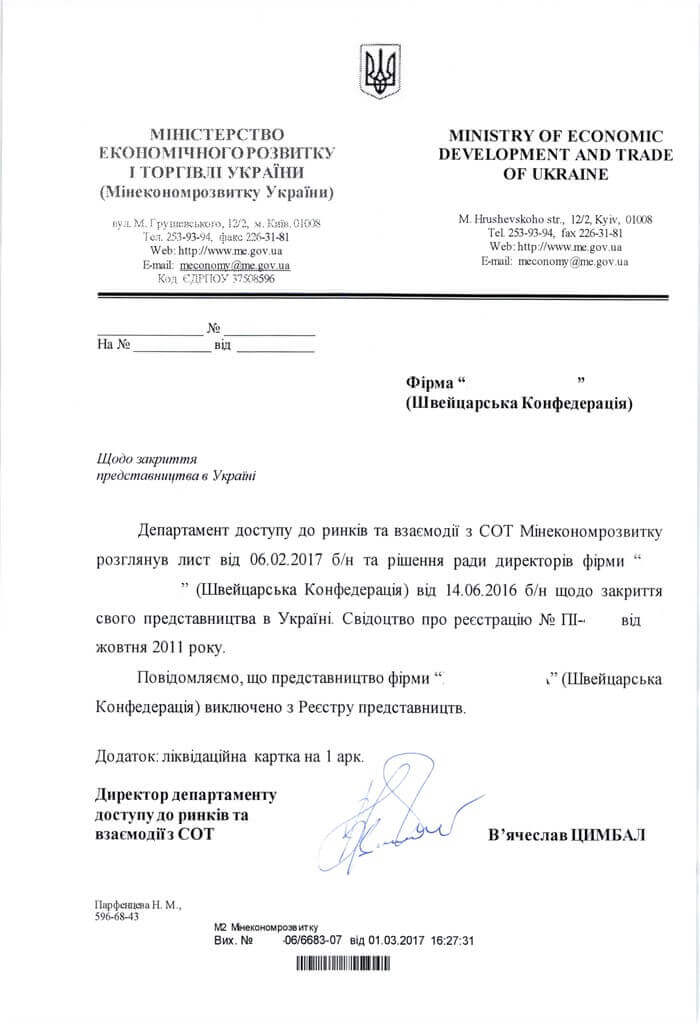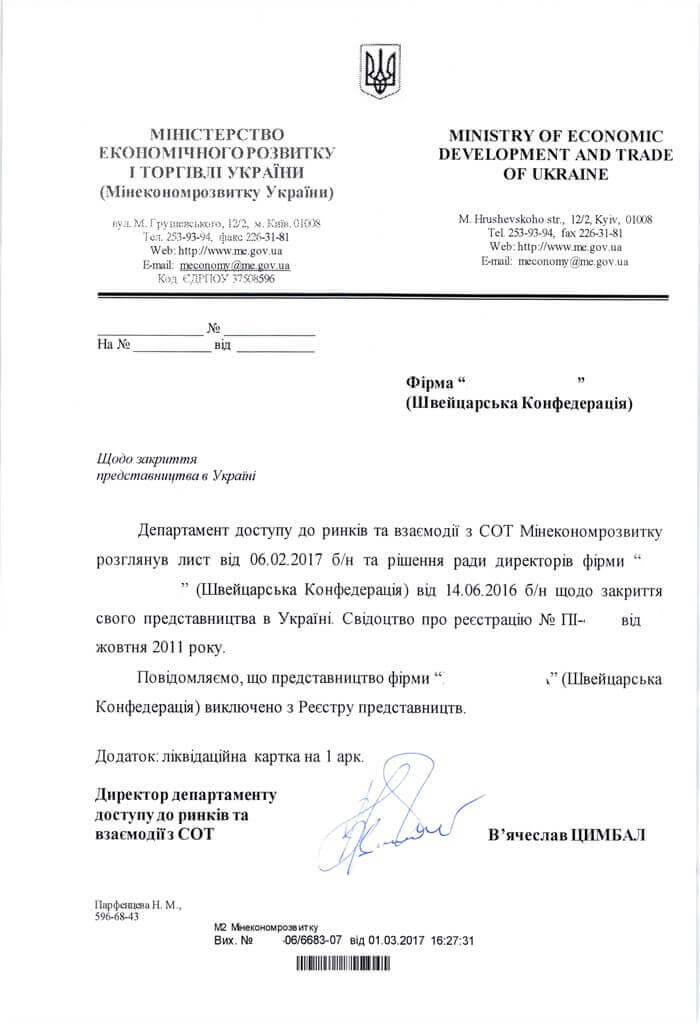What to do with the property on the balance sheet of a representative office in the event of its liquidation?
Cost of services:
Reviews of our Clients
Liquidation of a representative office is a complicated and lengthy procedure, in the course of which it is necessary not only to develop a package of documents, which will comply with the current legislation but also to visit state authorities more than once.
In this new article, lawyers will tell you how to properly dispose of the property and sell it during the company's liquidation.
Grounds and stages of liquidation of a foreign representative office
The most common reason for closing a representative office of a foreign company is the liquidation of the representative office based on the decision of the foreign business entity.
In general, the procedure for the liquidation of a representative office consists of the following stages:
- A decision is made to close the representative office (by the form corresponding to the legislation of the country where the parent company is registered). According to the decision, a liquidator or liquidation committee is appointed, as well as a deadline for filing creditors' claims.
- The next step is to notify the Ministry of Economy of the liquidation of the representative office.
- Then the employees of the representative office are dismissed as per the legislation of Ukraine.
- At the same time, the bank accounts of the representative office are closed.
- Then there is an inventory of the property of the representative office.
- Preparation and passing of inspections in the tax office, obtaining a certificate with the subsequent removal from the register.
- Collection of debts on debtors and settlements with creditors, payment of fines.
- Return to the Ministry of Economic Development and Trade of service cards of foreign employees, and the certificate of registration of the representative office.
- Transferring the documents of the representative office to the archive.
- Receiving the decision of the Ministry of Economic Development and Trade to cancel the registration record in the register of representative offices.
- Deletion from the register with the statistics agency (submit a special form).
- Destruction of seals and stamps of the representative office.
Please note! Liquidation shall be deemed successful upon cancellation of the registration in the registry of representative offices.
You may also like: Liquidation of a Representative Office in Ukraine with Debts
What to do with the property when liquidating a representative office?
Representative offices terminating their activities in Ukraine are faced with the need for evaluation, inventory, and distribution of property in liquidation. The property can be both movable and immovable, or different types of equipment.
The representative office appoints a liquidator or liquidation commission, which then makes arrangements for taking an inventory of the property. They identify and take measures to recover property held by third parties.
In cases prescribed by law, the liquidation commission (liquidator) ensures an independent assessment of the property of the representative office, which ceases to operate. It is also possible to involve an independent expert.
In this case, the evaluation of property consists mainly in bringing the value of assets to the cost of their realization, in the recognition of additional liabilities (for example, severance pay for employees), or in reducing the provision for reimbursement of future expenses (for example, for payment of employee leave), arising for the representative office in connection with the decision on liquidation.
You may also like: Closing a Representative Office in Ukraine in 8 Months
Distribution of property in the presence of liabilities to creditors
The problem with the distribution of property may arise when there are obligations to creditors. The property claims of the representation's creditors are satisfied from its property.
The claims of creditors are satisfied in the following order of priority:
I queue: claims for damages caused by injury, other injuries, or death, and claims of creditors that are secured by a pledge or otherwise shall be satisfied;
II turn: the claims of employees associated with labor relations, the claims of the author on payment for the use of the results of their intellectual or creative activity shall be satisfied;
III turn: claims on taxes, and fees (obligatory payments) shall be satisfied;
IV turn: all other claims shall be satisfied.
Please note! Claims of one turn shall be satisfied in proportion to the amount of claims pertaining to each creditor of that turn.
Upon expiry of the deadline for the submission of claims by creditors, the liquidator shall draw up an interim liquidation balance sheet including information on the composition of the property of the representative office being liquidated, a list of claims submitted by creditors, and the result of their consideration.
If the representative office being liquidated has insufficient funds to meet the claims of creditors, the liquidation commission (liquidator) shall organize the sale of the property of the representative office. The remaining property of the representative office after satisfaction of creditors' claims belongs to the owners - the parent company.
This is not an LLC, where the funds withdrawn for the sale of property are distributed among the participants, in accordance with the size of the shares.
How to sell the property in case of liquidation of a foreign representative office?
It is recommended to sell any property belonging to the representative office.
From the tax perspective, the sale of property or its transfer to the parent company is subject to analysis according to whether the representative office is permanent (carries out business activities in Ukraine and is a payer of income tax) or non-permanent (performs only representative function).
Sale of property by a non-permanent representative office during liquidation.
The main tax risk is the recognition of such representation as permanent at the time of receipt of income from the sale of the property. Accordingly, if through this operation, the representative office gets the status of "permanent", it falls under the criteria for taxpayer registration (including the sale of property transaction).
To avoid such a situation, you must necessarily:
- When drafting a contract for the sale of any property, name the parent company as the seller. The contract shall be executed on behalf of the Chairman of the Representative Office or other person authorized to sell the property.
- Execute a legalized resolution of the parent company (if none exists) authorizing the Representative Office Chairman (or other person) to sell the property to be liquidated (specifying the list of property and its characteristics).
- Draw up a legalized power of attorney in the name of the Chairman of the representative office or other person to whom the authority to sell the property during liquidation has been delegated.
- Execution of a legalized decision of the parent company, which will determine the information on the destination of the funds from the sale.
In this situation, the non-resident parent company receives income that originated in Ukraine. Such income is taxed according to the rules of:
- Immovable property located on the territory of Ukraine – 15% rate. It is paid at the time of transfer of income and from the amount of this income. For example, the transaction amount is ,000 at a rate of 36.5. The buyer at the time of the transfer of funds to the parent company accrues an income tax amount of UAH 54,750, and the difference is transferred to the parent company UAH 310,250 (the equivalent of $ 8,500).
- Income from the sale of other property – 15% rate. If a resident (except for group 4 single taxpayers) makes a payment of income in favor of a non-resident for the sale of goods (including furniture, and equipment) over the amount corresponding to the "arm's length" principle (UAH 10 million), the such resident must withhold the non-resident income tax from the excess and other income at 15% rate, unless another rate is set by international treaty, consent to which is granted by the Verkhovna Rada of Ukraine.
Sale of property by a permanent establishment during liquidation
A permanent establishment of a non-resident, carrying out activities on the territory of Ukraine, is a payer of income tax and its activities are taxed according to the general procedure.
That is, the financial result (taxable income) is taxed at the rate of 18%. The permanent establishment determines the amount of taxable income received during the reporting (tax) period by the "arm's length" principle.
The taxable profit of a permanent establishment must match the profit of an independent entity engaged in the same or similar activities under the same or similar conditions and operating in complete independence of the non-resident, whose permanent establishment it is.
In general, the procedure for the liquidation of representative offices is normatively defined. However, it should be noted that many issues arise in the process of liquidation. Some of them are not regulated on a normative level and only the practical experience of specialists who are already familiar with the procedure of liquidation and have repeatedly faced these problems allows to solve them correctly.
Our lawyers have the necessary experience and will help to solve all the necessary aspects in the process of liquidation.
Didn’t find an answer to your question?
Cost and information about the liquidation of the representation here.




